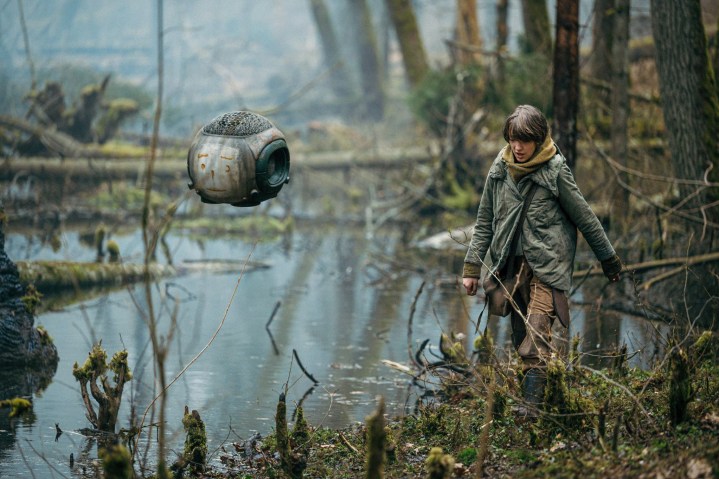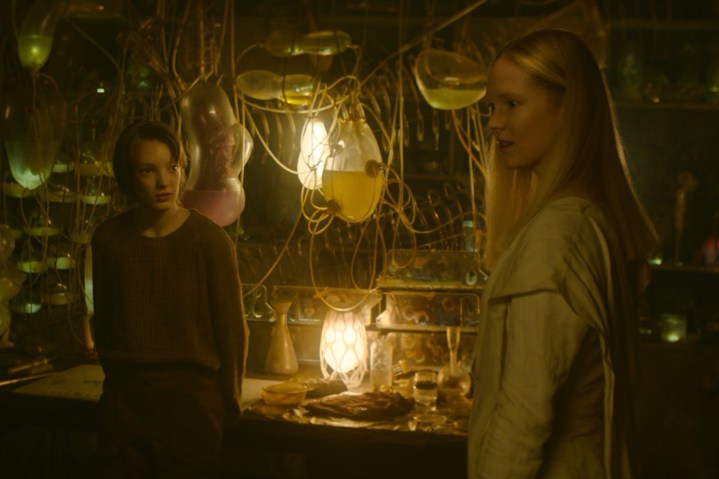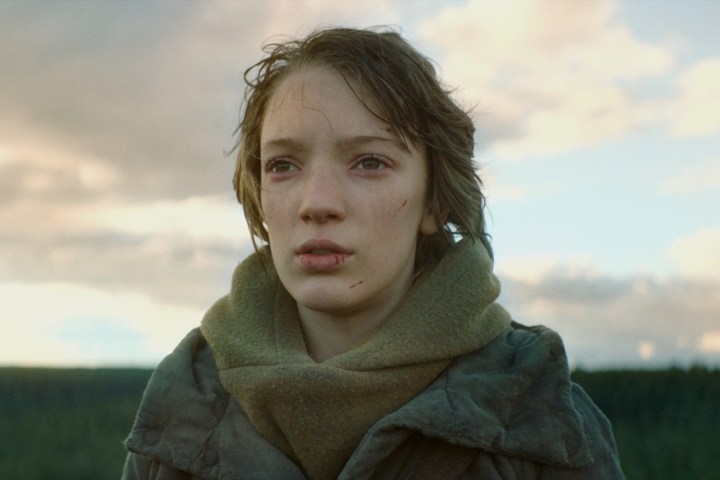Vesper does a lot with a little. Despite being made on an obviously lower budget than most other modern sci-fi movies, the new film from directors Kristina Buozyte and Bruno Samper takes place in a futuristic, post-apocalyptic world that feels more well-realized, vivid, and imaginative than any of Hollywood’s current cinematic universes do. While its premise doesn’t do much to sell Vesper as a unique entry into the dystopian sci-fi genre, either, it doesn’t take long for its fictional alternate reality to emerge as a striking new vision of the future.
The film’s opening shot throws viewers headfirst into a swampy, gray world that seems, at first, to be perpetually covered in fog. It’s an image that makes Vesper’s connections to other industrialized sci-fi films like Stalker undeniably, palpably clear. However, once Vesper escapes the foggy wasteland of its opening scene, it begins to flesh out its futuristic reality with rich shades of greens and colorful plants that breathe and reach out toward any living thing that comes close to them. While watching the film does, therefore, often feel like you’re being led on a tour through an industrial hellscape, it also feels, at times, like a trip down the rabbit hole and straight into Wonderland.

Much like the land that Alice famously fell into, Vesper‘s dystopian future contains wonders both terrifying and comforting. Set during a period that is only referred to by the film’s opening crawl as the “New Dark Ages,” Vesper takes place in a reality where the Earth was long ago transformed by various biological and genetic experiments gone awry. These experiments, we’re told, were conducted in the hopes of preventing the planet’s ecological collapse. Instead, they merely accelerated it, sending the world and all of its inhabitants tumbling into a reality where trees expand and shrink with every breath they take, plants move, and synthetic, multi-colored slugs lurk beneath the Earth’s permanently swampy floor.
In the aftermath of the world’s off-screen collapse, humanity was essentially divided into two groups: the privileged elites who get to live within tall, encased structures known as “Citadels” and those who have to make ends meet in the wilds of the film’s dilapidated Earth. Vesper (Raffiella Chapman), the film’s eponymous lead, is a member of the latter group. Fortunately, Chapman’s Vesper has become quite adept at surviving in even the harshest of environments by the time that Buozyte and Samper’s film catches up with her. Vesper‘s opening sequence even sees its young heroine overcome several obstacles in order to save the life of her paralyzed father, Darius (Richard Brake), who uses a telepathic link to communicate with her via a flying drone that accompanies his daughter everywhere she goes.
Vesper and Darius’ lives are thrown into complete disarray, though, when the former unexpectedly stumbles upon an unconscious woman named Camellia (Rosy McEwen) in the woods. Vesper takes in Camelia, a stranger from one of the nearby Citadels, in the hopes that she might be able to help Vesper finally escape the creaky old house that she and her father have lived in for too long. What Vesper doesn’t realize, however, is that Camelia is secretly involved in a conspiracy that not only puts some very dangerous targets on their backs but also catches the attention of Vesper’s abusive, controlling uncle, Jonas (Eddie Marsan).

Vesper, notably, takes its time getting into the conflict that led to Camelia’s chance encounter with Chapman’s resourceful young survivor. The film’s script, which Buozyte and Samper wrote with Brian Clark, largely prioritizes atmosphere and world-building over plot progression. That means the first 30 minutes of Vesper are more concerned with setting up the film’s futuristic world, as well as its young heroine’s place in it, than they are with generating conflict. For some viewers, this may result in Vesper moving too slowly than they would have liked.
That said, it’s easy to see why the film’s creative team was more interested in Vesper‘s intricate sci-fi world than in its straightforward and predictable story. Not only are many of the film’s plot twists fairly obvious and easy to predict, but Vesper’s limited production budget also prevents it from making its third act as action-packed as its story demands. As a result, while there’s never a moment when Vesper truly loses hold of its viewers, the film’s measured pace and ultimately subversive finale do make the smallness of its scope unavoidably clear.

Within the film itself, both Eddie Marsan and Richard Brake help bring a sense of on-screen authority to Vesper. Marsan, in particular, is exceptionally well-cast as Jonas, a man who takes immense pride in the crude ways he’s managed to carve out a space for himself in Vesper’s dystopian world. Opposite him, Raffiella Chapman turns in a youthful but quietly assured performance as Vesper, one that manages to highlight her character’s innate, childlike innocence without ever short-changing her abilities or intellect.
Additionally, while Vesper’s smaller production budget does frequently prevent Buozyte and Samper from exploring the film’s story as deeply as they probably would have liked, the directors do still manage to fill it with consistently memorable images. One brilliantly inventive scene even follows Vesper and Camelia as they climb onto different chairs and tables in order to avoid touching a biological weapon that takes the form of a yellow mold that rapidly spreads and covers everything it comes into contact with.
The sequence in question calls to mind similar moments in movies like Minority Report and Annihilation, and the fact that Vesper is even able to seem reminiscent of those films is a further testament to its ability to transcend its own financial constraints. For a film that ultimately isn’t able to take its own plot as far as it probably should have, Vesper still manages to tell a visually striking and imaginative story, which is more than can be said for many of Hollywood’s recent sci-fi blockbusters.
Vesper is now playing in theaters and on VOD.



